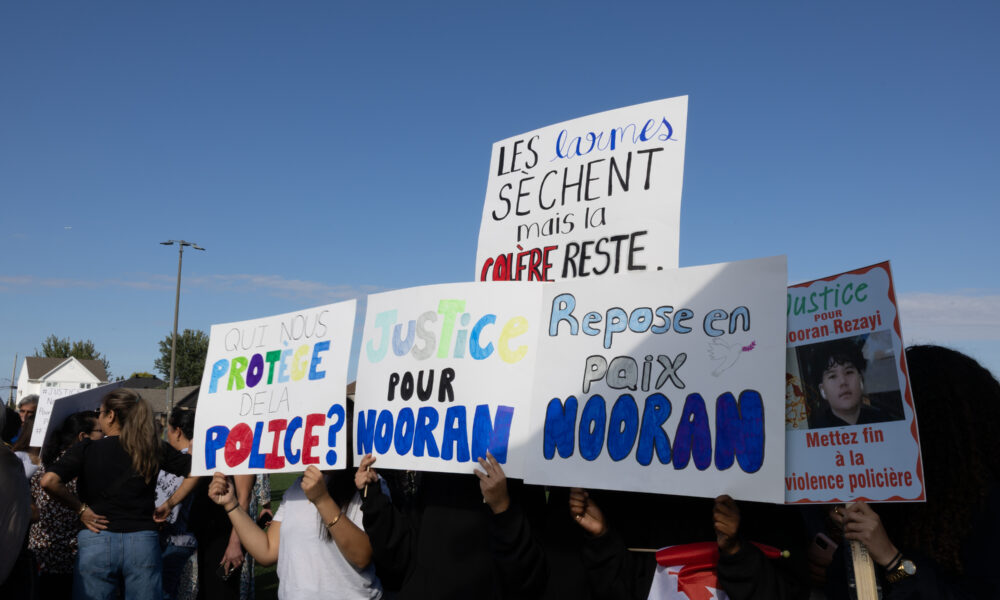On Sept. 21, a police officer shot and killed 15-year-old Nooran Rezayi in a residential neighbourhood in Longueil, a suburb of Montreal. Radio Canada alleges the officer pulled the trigger just 58 seconds after arriving on the scene.
At 2:48 p.m., an individual called the police to report a group of allegedly armed people dressed in black in a public area. The first patrol car arrived at 2:57 p.m. Bystanders ostensibly claim that Nooran Rezayi reached into his backpack in front of him to show he wasn’t carrying a weapon, but the officer on scene opened fire twice. The officers attempted CPR and rushed him to the hospital, but they couldn’t revive him.
This type of incident demonstrates the urgency to deconstruct the systemic racism ingrained within Montreal’s police system. Although one police officer is responsible for pulling the trigger, the murder of Nooran Rezayi exposes a violent and deadly chain of systemic targeting and violence against racialized groups. If 58 seconds was all it took for discriminatory assumptions to become lethal, we must confront this pervasive racism at every level: From the criminalizing calls that report, to the officers who respond, to the institutions that investigate these horrific acts.
This escalation can be traced back to the 911 call, which described Nooran Rezayi and his friends as allegedly armed and dressed in black—language that implicitly signals danger. The dire necessity of this reckoning is evident as even police leadership acknowledges the pattern in how racialized individuals are portrayed in emergency reports. Fady Dagher, the current Service de Police de la Ville de Montréal’s (SPVM) police chief, in a podcast by Sans Filtre Podcast, explained how he recalls receiving calls from individuals saying that there were violent gangs of Black people in an area, and when he would arrive on the spot, he would find youth community members playing games. Examples such as these reinforce how racialized youth are frequently and unfairly perceived as inherently violent and dangerous—judgments that directly shape how officers respond, often with detrimental consequences to the communities they are supposed to protect.
Nooran’s murder exposes two failures: the racialized assumptions that perceive Black and brown youth as threats, and the failure of certain accountability measures. While measures exist and have existed to train officers and promote community engagement, these efforts are undermined when officers seem to face little to no punishment for misconduct. In response to the shooting, the Bureau des enquêtes indépendantes (BEI), an independent unit that investigates cases “where a person other than a police officer on duty dies, is seriously injured, or is injured by a firearm used by a police officer,” opened an inquiry. However, the BEI rapidly received backlash on social media, including in a recent article in Le Devoir, with many doubting the unit’s commitment to holding police officers on duty accountable for their actions. This is because since the BEI’s creation in 2016, 467 investigations have been opened, with 65 of them resulting in an intervention where a civilian has been killed at the hands of a police officer. The BEI has opened only 2 judicial procedures and has failed to enforce a single criminal accusation or condemnation of any officers involved in these palpable acts of violence and abuses of power. As the investigation continues, the message many communities receive is troubling—officers can target and kill without facing real consequences.
Reform conversations when it comes to policing often focus on withdrawing weapons from police officers, requiring body cameras, or reducing the SPVM’s budget. While these matter, they obscure the fundamental issue, which is that systemic racism doesn’t just live within police departments—rather, it permeates every level of society, shaping who gets reported as “dangerous,” how officers perceive “threats” to which lives are devalued.
The murder of Nooran Rezayi wasn’t an isolated tragedy or a single officer’s mistake. Real accountability requires more than investigating individual officers—it demands we dismantle the racist assumptions embedded in every stage of this fatal cascade of racism and set the precedent for accountability. Hopefully, this investigation will proceed to its full course, ensuring that accountability is upheld for Nooran—as it should be for everyone.







